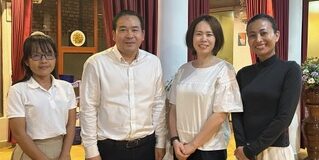Internship at UNESCO Beijing Office (Xiaoxiao JIA)
I worked as an intern at UNESCO Beijing Office from July 27th until October 27th. During the period of my internship, I assisted the program specialist as well as my...
Graduate School of International Cooperation Studies (GSICS), Kobe University


I went to Cambodia in February 2024, to collect data for my doctoral dissertation. My research applies a qualitative approach to analyze how families are involved in choosing higher education in Cambodia. The data collection process consisted of online surveys and individual interviews. I also went to a governmental office and educational institutions. During my stay in Cambodia, I was able to collect data with the cooperation of His Excellency Dr. Lim Sothea from the Ministry of Education, Youth and Sports (MoEYS) of Cambodia.
The research area was Phnom Penh, the capital of Cambodia, and Kandal province. The primary survey was conducted online for high school students and university students. Afterward, I interviewed students based on the results of the online survey at schools. In addition to this, interviews with parents were conducted at their house or near their home. Cambodia’s education system is divided into various shifts, such as morning, afternoon, evening, and weekend courses, and it was not easy to plan a research schedule while taking these schedules into account. However, thanks to the support of not only MoEYS staff but also high school and university teachers from coordinating school visit schedules to interviews. Thus, I was able to visit multiple high schools and universities and conduct interviews with more than 40 people. Interviews with family members dealt with personal experiences, family relationships, and Cambodian cultural content, so there were many situations in which consideration needed to be given to the participants. As a result, I was able to obtain richer and more detailed information than I expected.
Through this field research, I was able to gain a deep understanding of the involvement of family members other than parents in higher education choice, which had not been clarified to date, and the relationships between parents and children and between family members. I was able to obtain valuable information and documents that would otherwise be difficult to obtain. Even if I, as an outsider and Japanese person, conduct this type of investigation on my own, and request the investigation, it may not go well. However, the reason I was able to obtain such valuable information was also due to Professor Keiichi Ogawa’s advice. Furthermore, the Ogawa seminar has many international students from Cambodia and people with fieldwork experience, so I think it was a big help that I was able to consult with them and make various preparations in advance.
Lastly, I would like to once again express my deep gratitude to His Excellency Dr. Lim Sothea, the staff at MoEYS, who kindly accepted my internship in Cambodia, and Professor Keiichi Ogawa for providing me with such a valuable opportunity. Additionally, I would not have been able to conduct this research alone without the support of Ms. Rachana, a MoEYS staff member, and Ms. Mliss and Mr. Da, who excellently coordinated and supported the interviews. I would like to take this opportunity to thank everyone for their cooperation.
Authored by Mami Fujiwara (Doctoral Student)